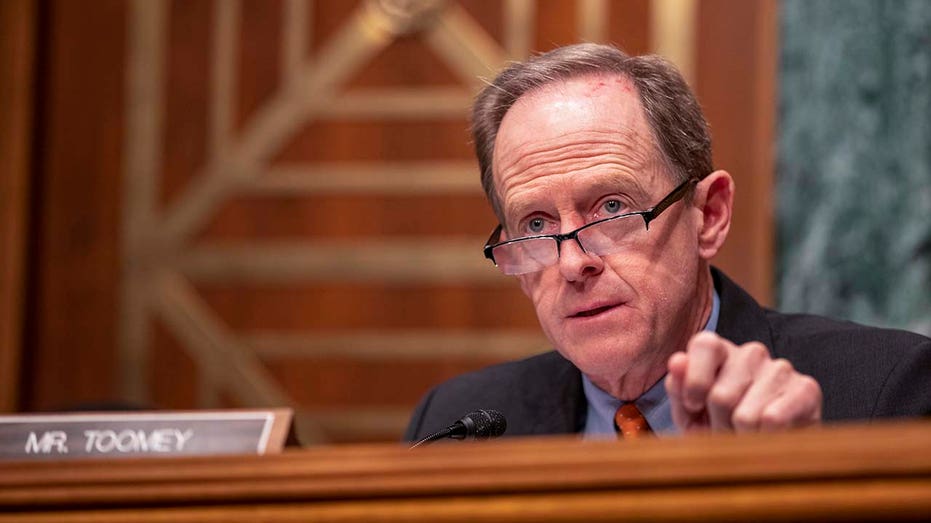Bank regulator’s anti-racism efforts go too far, witnesses tell Senate: ‘Disparity is not discrimination’
Witnesses said different outcomes are not an automatic sign of discrimination
Big banks 'laying the ground work' for a potentially difficult 2023: Kenny Polcari
Slatestone Wealth chief market strategist Kenny Polcari argues investors have to recognize that 2023 could be a volatile time for markets.
Efforts to root out racism in the financial sector need to be focused on ending policies that are purposefully discriminatory, not policies that are fair but still lead to different outcomes for minorities, witnesses told the Senate Banking Committee Thursday.
The debate took place a few months after the Biden administration’s Consumer Financial Protection Bureau (CFPB) announced it would prosecute "disparate impact" policies that are deemed to harm minorities even though they were not designed with that purpose in mind, in addition to "disparate treatment" policies that are explicitly designed to have that effect.
The debate has sharply split Republicans and Democrats. Sen. Pat Toomey, R-Pa., said at the hearing that CFPB’s decision is an example of "brazen overreach" because Congress never approved of tackling unfair treatment using a disparate impact approach. Toomey said CFPB’s decision means banks are under threat of prosecution for any policy that leads to any marginal difference in treatment between racial or ethnic groups.
TOOMEY LEADS CHARGE AGAINST ESG RATINGS FIRMS

Sen. Pat Toomey said the CFPB has exceeded its authority by using a disparate impact standard to judge discrimination in financial institutions. (Tasos Katopodis/Getty Images / Getty Images)
In September, the U.S. Chamber of Commerce sued CFPB for its policy change, which the group said is "beyond its statutory authority" and shows the agency is "pursuing an ideological agenda that goes well beyond what is authorized by law."
At the hearing, only one witness argued in favor of disparate impact policies. Lisa Rice, president and CEO of the National Fair Housing Alliance, said any policy that results in any different treatment of minorities should be eliminated even if they are not "explicitly discriminatory on their face."
"The law should explicitly prohibit disparate impact discrimination – a doctrine the Supreme Court has described in the housing context as playing a significant role in furthering the goals of ‘eradicat[ing] discriminatory practices within a sector of the Nation’s economy,’" she said in her written testimony.
CFPB LOOKS TO REGULATE BUY NOW, PAY LATER COMPANIES

President Biden's Consumer Financial Protection Bureau has been sued for using a "disparate impact" standard. (Reuters/Evelyn Hockstein | Ting Shen/Bloomberg via Getty Image / Reuters Photos)
But two others said that would be a mistake. Devon Westhill, president and general counsel of the Center for Equal Opportunity, said he was worried about CFPB’s decision.
"Disparity is not discrimination," he said in his written testimony. "It makes little sense to equate imbalances in one way or another, such as in the racial composition of loan recipients, with discrimination. Imbalances often have a multitude of contributing factors and do not always disfavor minorities."
He said if disparate impact policies are permitted, they will create incentives for those in the financial industry to judge customers "in part by the color of their skin." He also said the disparate impact standard is being used "precisely because disparate treatment on the basis of race has not been shown."
Another witness, Rep. Byron Donalds, R-Fla., warned that the disparate impact standard can lead to government overreach.
JPMORGAN, OTHER BANKS IN TALKS TO REIMBURSE SCAMMED ZELLE CUSTOMERS

Rep.Byron Donalds told the Senate that the "disparate impact" standard should not be used to judge discrimination in the financial sector. (Dylan Hollingsworth/Bloomberg via Getty Images)
"Discrimination and disparate impact are not the same, and we’ve got to understand that equal opportunity doesn’t necessarily mean equal outcomes," Donalds said. "If individuals lack credit worthiness and that impacts other outcomes relating to financial services, we should be looking at ways to address this, like alternative data."
During the hearing, Westhill said Americans should be careful of arguing that discrimination is everywhere because that message can create a disincentive for younger Americans.
CLICK HERE TO GET THE FOX BUSINESS APP
"I think it’s terribly disempowering if we tell young minority kids in this country that there’s discrimination everywhere, there’s racism everywhere, there’s bias everywhere, that it’s institutionalized, that you’re going to see it at every turn," said Westhill. "That’s terribly disempowering. Why would you want to really try your best and succeed and achieve when you know you can’t do it anyway?"




















